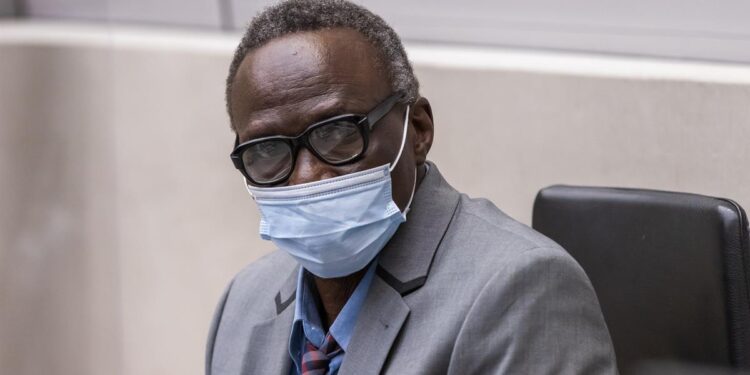By Janet Sankale
Mary Wasike
The International Criminal Court has once again extended the detention of former Janjaweed commander Ali Muhammad Ali Abd-Al-Rahman.
The judges said there was no change in circumstances to warrant a different decision in the case.
The Trial Chamber I judges made the ruling on November 1, 2021, after conducting their first review of Abd-Al-Rahman’s detention, which was scheduled to expire on November 3, 2021. Rule 118(2) of the Rules of Procedure and Evidence states that the detention of a defendant is reviewed every 120 days. Previous reviews had been conducted and decisions to continue detaining the accused made on December 11, 2020, April 12, 2021, and July 5, 2021 by Pre-Trial Chamber II, which confirmed 31 charges against him on July 9, 2021.
The court initiated the process on September 15, 2021 by instructing the parties involved in the case – the Office of the Prosecutor, the Office of the Public Counsel for Victims, the Legal Representatives of Victims, and the Registry – to submit their observations on the review by October 15, 2021. The defence was ordered to file a response by October 22, 2021. It was also asked to file a request to hold a hearing, which it did on October 13, 2021. The chamber held the hearing on October 25.
Trial Chamber I, composed of Judge Joanna Korner (presiding), Judge Reine Alapini-Gansou, and Judge Althea Violet Alexis-Windsor, found that the confirmation of charges against Abd-Al-Rahman constitute a change in circumstances, but did not agree with the defence’s submissions that this favours his conditional release.
“According to the consistent and longstanding jurisprudence of the court, the confirmation of charges increases the risk that an accused may abscond and is not a changed circumstance that would support conditional release… Moreover, the number, nature and gravity of the charges means that if convicted, a lengthy sentence is likely to be imposed on the accused. This factor increases the risk that the accused may abscond if released,” the judges said.
The court rejected the defence’s contention that new information in an investigator’s report it annexed to its observations constitutes a change in circumstance as it refutes the prosecution’s allegations of potential threats to witnesses. The defence claimed the report corroborates its “pre-existing instructions that from late 2019 into early 2020, indeed until the date [its] client surrendered himself into the hands of the OTP, he was essentially on the run. He was in hiding”, thus implying that he could not have intimidated witnesses. But the chamber said it was unable to accept that the contents of the report are capable of providing such corroboration.
The judges disagreed with the defence’s submission that the reliability and credibility of a report annexed to one of the prosecution’s responses was undermined by a video allegedly depicting the event described in the report. They said the fact that the defence had accepted that the person speaking in the video the prosecution revealed resembles the accused, taken with the report it was disputing “…is capable of lending support to the prosecution’s submissions that the accused, if granted conditional release, presents a potential or actual risk to witnesses because of his previous position of power and the likelihood that he still has supporters who may have access to actual or potential witnesses”.
The court dismissed as irrelevant to the matter before it the defence’s submission of information about the cooperation between the court and Sudan to the effect that, in surrendering himself, Abd-Al-Rahman was in breach of the law that made cooperation with the court an offence punishable by the death penalty.
The chamber noted that the disclosure of the witnesses’ identities to the defence was going until January 5, 2022, adding that this was also dependent on the prosecution’s and the Registry’s ability to protect the witnesses. It said full disclosure of witnesses’ identities and witness protection favoured the continued detention of the accused rather than his conditional release.
The court agreed with the defence’s contention that the events currently taking place in Sudan should not have an impact on their decision as it was unclear what effect, if any, they would have on the case. The Legal Representatives for the Victims had mentioned the Sudan situation in their observations at the hearing on detention.
The judges acknowledged Abd-Al-Rahman’s right to family visits and that the court has an obligation to make this possible. However, they said, this right does not outweigh the other factors considered in the case. They further noted that the defence has not made any request to the Registry to organise video-calls with his family. They rejected the defence’s submission that the right of the accused to have contact with his family is inoperative or that this is a factor compelling the chamber to order his release.
The chamber rejected the defence’s claim that the fact that the trial is set to commence on April 5, 2022 constitutes a changed circumstance warranting the release of the accused. It said it found the trial date reasonable. The judges recalled that the defence had requested February 2022 and the prosecution June 2022.
The judges accepted the prosecution’s submission that there are no substantially changed circumstances that warrant the release of the accused.
“It is self-evident and in line with the jurisprudence of the court, that in the interests of justice, the chamber will continue to review Mr Abd-Al-Rahman’s detention until the commencement of the trial,” they concluded.







